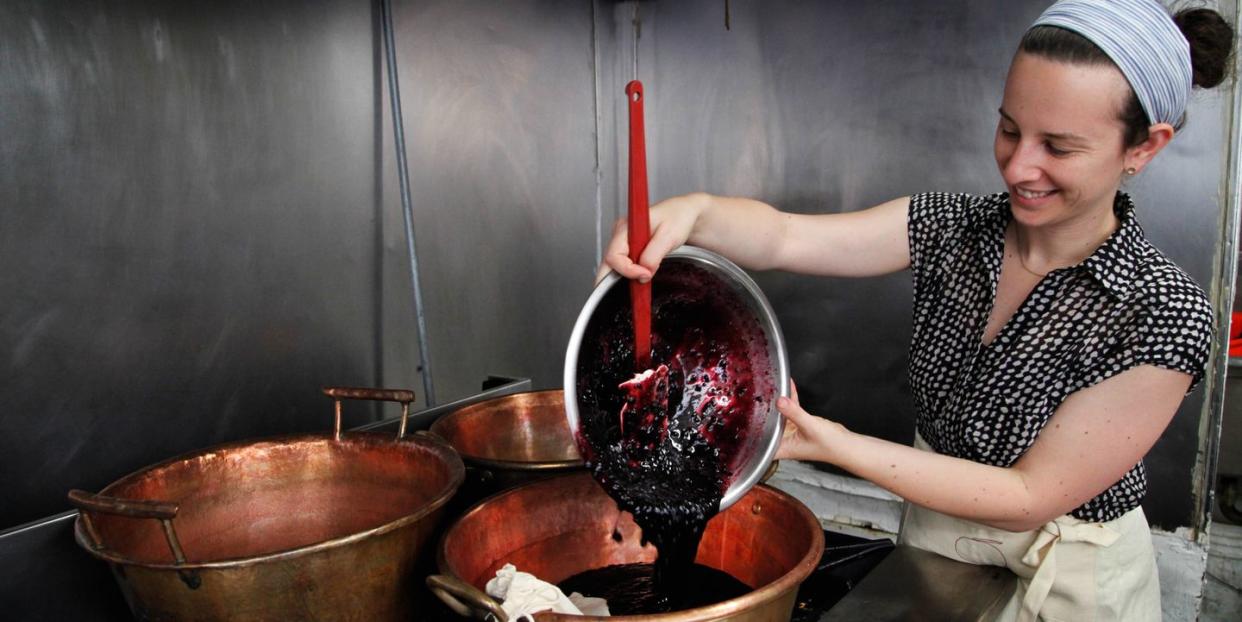A Trendy LA Restaurant Was Accused Of Scraping Mold Off Of Jam Before Serving It

Trendy Los Angeles food spot Sqirl was accused over the weekend of mishandling food, including allegedly telling employees to scrape mold off of the top of vats of its famous jam and continuing to serve the product.
It all started when Joe Rosenthal, a self described "scientist and food antagonist" published DMs from alleged current and former employees of trendy L.A. restuarant, Sqirl. They accused the company of not storing its famous housemade jam properly. And they accused Sqirl of housing their jam in a walk-in fridge in an offsite kitchen, and allegedly telling employees to scrape layers of mold from the tops of the jam then serve it to customers, according to Eater. There were also photos of the alleged moldy jam buckets, which you can see here, but I will not embed for your sake.
Sqirl has made a name for itself in recent years because of said jam (and, you know, it's famous and very expensive toast). The fruity spread has become popular with fans around the country and can be purchased online and shipped to those unable to visit the California spot in person. So because of the jam's popularity and the, um, disgusting accusations, Sqirl became a trending topic quickly.
The restaurant took to social media (the statement's been attributed by many to owner Jessica Koslow) to deny some of the accusations, in part saying that because its jam is low in sugar and doesn't contain sweeteners or stabilizers, there had occasionally been mold on the restaurants' jam (not commercial jam sold to customers in jars). It was compared to mold that grows on some cheese and charcuterie. They said that it was removed, along with several inches of jam below the mold and handled with "guidance of preservation mentors and experts." You can read the entire statement in their tweet below or by going here. Delish did not immediately hear back after a request for comment.
There have been a lot of questions about our jam this weekend. Here are our answers: pic.twitter.com/ELDngZCms1
— SQIRL (@SQIRLLA) July 12, 2020
When reached by The Washington Post, Dr. Patrick Hickey, a preservation mentor and expert name-dropped in the statement, said he does not recall ever meeting or speaking with Koslow. He had been quoted in the BBC previously saying that in home kitchens, scraping off mold was likely fine, but that in a commercial setting, it was not the same. The USDA’s Food Safety and Inspection Service recommends that any jam or jelly containing mold be thrown out.
"The mold could be producing a mycotoxin. Microbiologists recommend against scooping out the mold and using the remaining condiment," their website reads.
Koslow then issued another statement, which was obtained by Eater (you can read it in full over there!), apologizing and expanding further. Koslow said that she had "acquired a secondary kitchen" in the space that is now its take-out business Sqirl Away and that it "fell off the radar of the Health Department." She denied that any jam had been made in the secondary kitchen, saying that it was made in the main kitchen "and then cooled and moved to the secondary kitchen for storage." She said that all three of her kitchens (including a catering business) have received an "A" rating from the Health Department, saying that the department has known about their secondary kitchen since 2018.
She went on to say that all the commercial jam it sold to customers was made with a "'hot pack' method" that makes mold growth "basically impossible" and that "occasional" mold would grow on the jam reserved for the restaurant kitchen. Among other things, she said that she will now use this same "hot pack" method in its restaurant jam, start storing it in smaller glass containers, and would be submitting samples of its jam to a lab to ensure its safety. She said they have thrown out any jam with mold on it and "will continue to do so moving forward."
"I eat the same jam I serve my customers, family and friends and would never knowingly serve any food that would put their health at risk. I realize that I was wrong and I am sorry," she said in the statement.
On top of the allegations of mold, Koslow was also accused of taking credit for recipes created by former employees like former Sqirl chef de cuisine Javier Ramos and former chef Ria Dolly Barbosa. Koslow said of these accusations to The Washington Post:
"This model where gifted chefs create and the restaurant becomes known for their food is not a new phenomenon in our industry. Unlike the vast majority of restaurants, I have done my best to regularly credit our chefs in our social media as recognition for their contributions to Sqirl and will continue to do that."
You Might Also Like
